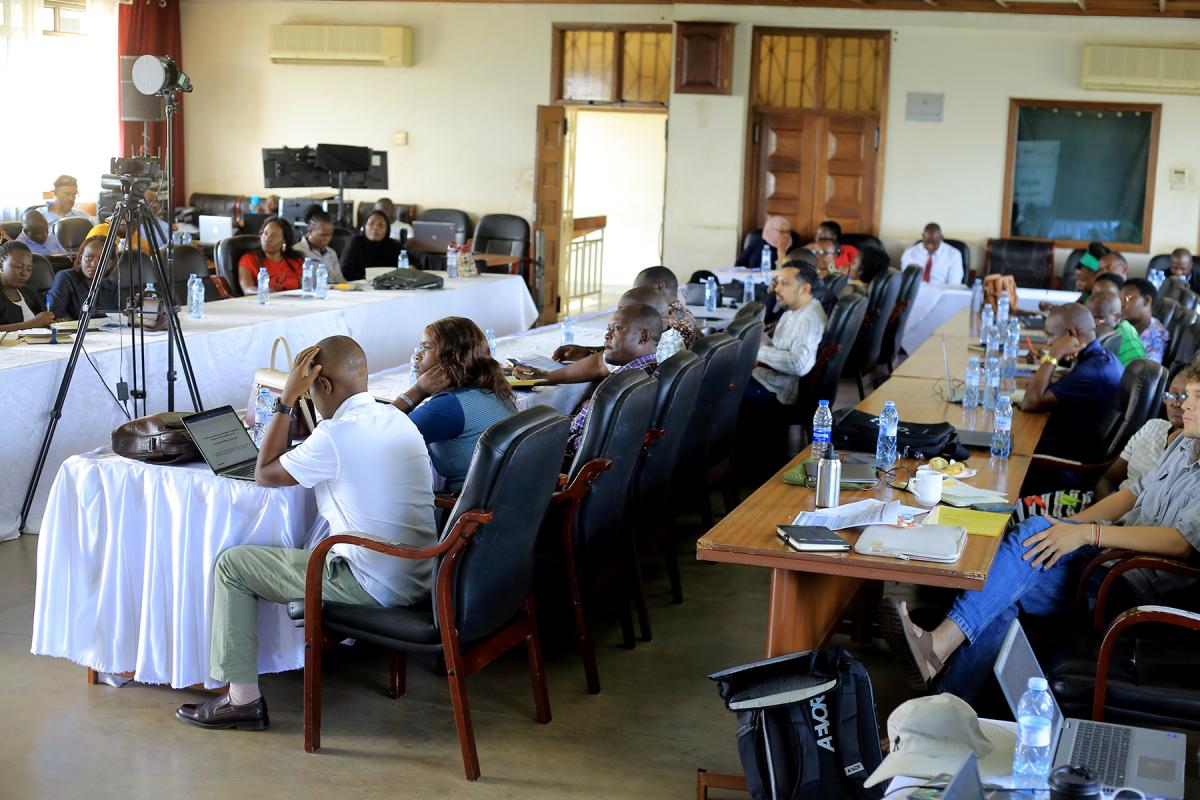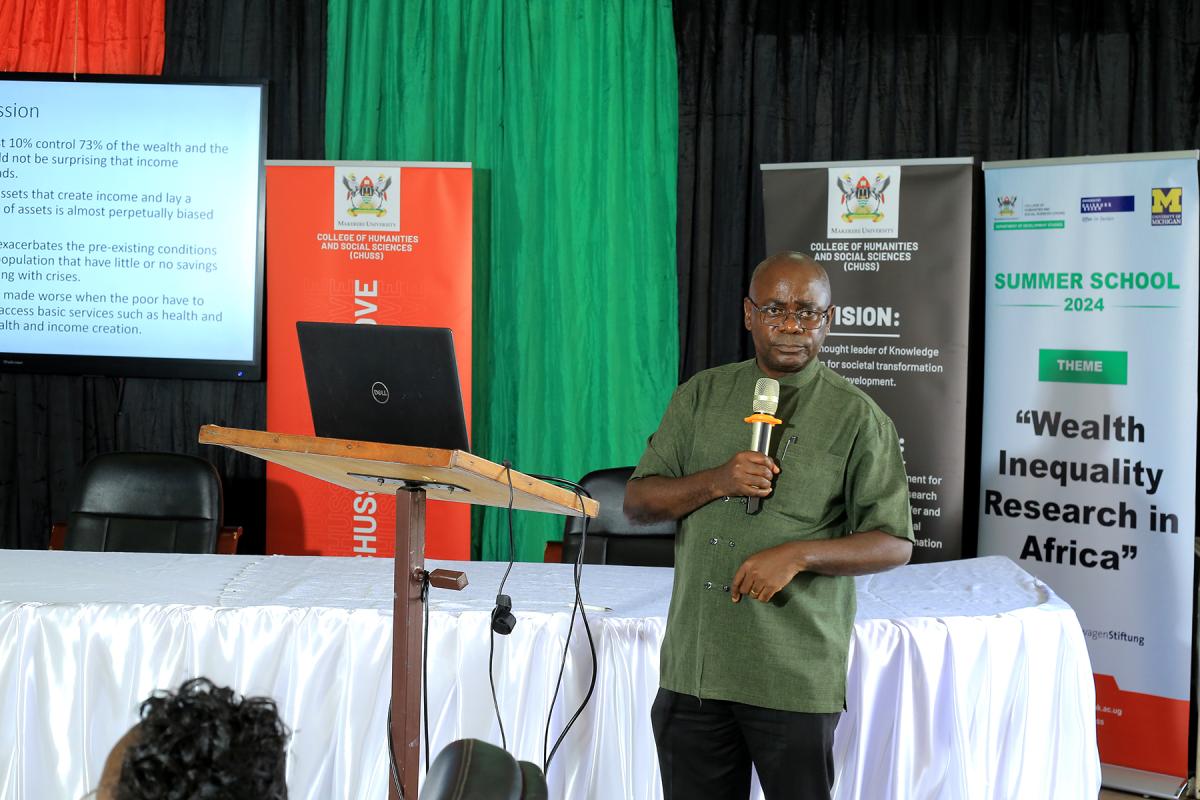
From September 16th to 22nd, 2024, Makerere University in Kampala, Uganda, hosted a significant summer school program, bringing together over students from East Africa and the Global North. The event, held under the theme "Wealth and Inequality Research in Africa," was organized by the University of Duisburg-Essen (Germany), Makerere University (Uganda), and the University of Michigan (USA), with funding from the Volkswagen Foundation.
The summer school, convened by Dr. Resty Naiga of Makerere University's Department of Development Studies, was officially opened on September 17th by CHUSS Principal Prof. Helen Nambalirwa Nkabala, representing the Vice Chancellor. Dr. Fred Muhumuza, a renowned development economist from Makerere's School of Business, delivered the keynote address on "Wealth Inequality Research: Capacity Building in Higher Institutions in Africa."
The program aimed to address the growing issue of wealth and income inequality in Africa, which has worsened despite global predictions. With a focus on the drivers of inequality, including class, gender, and rural-urban divides, participants engaged in collaborative research to enhance understanding and develop interdisciplinary approaches for analyzing and addressing wealth disparities.

Vice Chancellor’s Representative Opens Summer School with a Call for Collaboration and Innovation
The Summer School was officially opened by Associate Professor Helen Nambalirwa Nkabala, Principal of the College of Humanities and Social Sciences, representing Vice Chancellor Professor Barnabas Nawangwe. Prof. Nkabala emphasized the significance of the event and highlighted the contributions of various partners and participants.
“I am truly delighted to stand before you this morning,” Prof. Nkabala began. “Although our Vice Chancellor is unable to join us today due to an official duty abroad, he sends his heartfelt greetings and hopes to join us by the end of the summer school.”
Prof. Nkabala expressed gratitude to the Department of Development Studies from the School of Liberal and Performing Arts for their efforts in organizing the event. She noted that of the 287 applicants, only about 50 were selected, underscoring the competitive nature of the program.
“We deeply appreciate the hard work and dedication of our partners. Your commitment strengthens our collaboration and fosters new opportunities,” she said. “This summer school originated from a simple conversation at a conference, and it is a testament to the power of networking and partnership.”
Addressing the participants, Prof. Nkabala encouraged them to seize the opportunity presented by the summer school. “You are here because of your potential. This is a space where you can practice research, enhance your training, and build capacity,” she stated. “With ten institutions represented in this room, it is the perfect environment to explore new ideas and innovations.”
She also paid tribute to Professor Muhumuza, the keynote speaker, praising his practical approach to teaching and his contribution to the event. “We are honored to have a keynote speaker who not only teaches but also practices what he preaches,” Prof. Nkabala said. “Your presence here and the expertise you bring are invaluable.”
Concluding her remarks, Prof. Nkabala encouraged participants to engage fully and share their experiences. “This summer school is a learning space for all of us. I urge you to contribute your knowledge and stories, making this event a success,” she said. “I trust the team led by Dr. Naiga and encourage you to build networks that extend beyond this event.”
Prof. Nkabala officially declared the summer school open, setting the stage for a fruitful and collaborative learning experience.
The Summer school is a platform for meaningful discussions and collaborative learning, with a focus on advancing research and solutions in the realm of wealth inequality.
The Lead convener and Head Department of Development Studies and Makerere University expressed gratitude to the attendees and highlighted the importance of the event’s partnerships and objectives.
Dr. Naiga paid tribute to key partners who played a crucial role in organizing the summer school, Professor Helen Nambalirwa Nkabala, for her dual role and paid gratitude to Vice-Chancellor Professor Barnabas Nawangwe for his unwavering support in promoting research at Makerere University. “Professor Nawangwe’s passion for research and his efficiency in handling documentation are pivotal to our success,” Dr. Naiga stated.
Special thanks were also given to Professor Sylvia Antonia Nakimera Nanyonga-Tamsuza for her swift resolution of administrative challenges, ensuring the summer school’s smooth execution. “Her quick action and personal touch were invaluable,” Dr. Naiga added.
The event attracted participants from over ten universities, including the University of Michigan, University of Dar es Salaam, and Gulu University, highlighting its broad appeal and significance. Dr. Naiga emphasized the summer school’s focus on addressing wealth inequality in Africa, a topic often overshadowed by poverty-related research.
“The motivation behind this summer school is rooted in the need to address wealth inequality, a critical issue that has been under-researched in Africa,” Dr. Naiga explained. “We aim to build capacity and foster innovation in this field, providing valuable insights and methodologies for addressing these challenges.”
Dr. Naiga concluded by expressing hope that the diverse range of facilitators and participants would contribute to a fruitful and impactful summer school. “We are excited about the interdisciplinary approach and the opportunity to tackle pressing issues of inequality,” he said. “Thank you all for your enthusiasm and commitment to making this event a success.”
Economic Policies and Wealth inequality Affecting Livelihoods-Dr. Fred Muhumuza
Dr. Fred Muhumuza, a distinguished development economist and Director of the Africa Economic Forum, delivered a keynote address, titled “Wealth Inequality Research: Capacity Building in Higher Institutions in Africa,” emphasizing the urgency of addressing wealth inequality and its broader implications for economic stability and development.
Dr. Muhumuza underscored the critical nature of wealth inequality, contrasting it with the more commonly discussed income inequality. “Wealth inequality is a foundational issue,” he stated. “Income is derived from wealth—whether it’s social capital, financial assets, land, or natural resources. Income inequality often arises from disparities in these assets.”

Dr. Muhumuza illustrated how wealth inequality affects livelihoods and economic policies. “Many individuals lack sufficient assets to secure stable livelihoods,” he noted. “Moreover, existing legal frameworks frequently fail to protect those with assets. Issues like land grabbing and economic policies that undermine asset value contribute to a deepening wealth inequality.”
He praised the collaboration between Makerere University’s Department of Development Studies, Michigan University, and the University of Greensburg, highlighting the importance of such partnerships in addressing wealth inequality. “This joint effort is crucial for advancing our understanding of wealth inequality and its drivers,” Dr. Muhumuza remarked. “While resolving these issues will take time, initiating this dialogue is a significant step forward.”
Research into Legal and Policy Frameworks required to address Wealth Inequality
Dr. Muhumuza outlined several key areas for research and discussion during the summer school. He urged participants to investigate legal and policy frameworks that may perpetuate wealth inequality. “Policies that benefit the wealthy, such as government bonds accessible only to the affluent, widen the gap between the rich and the poor,” he explained. “Furthermore, examining how income is utilized is crucial. Effective government investment in housing, health, and education can enable individuals to save and build assets, thereby addressing wealth inequality.”
The keynote speaker also addressed governance issues related to wealth inequality. “The seven pillars of the Parish Development Model, which are meant to lift people out of poverty, need to be thoroughly addressed,” he said. “Providing financial assistance alone is insufficient if infrastructure, education, and health systems are not improved. Effective governance and administrative structures are essential to ensure that resources are utilized effectively.”
Dr. Muhumuza concluded his address by expressing support for the interdisciplinary approach of the summer school. “We are pleased to see a broad, interdisciplinary approach to researching wealth inequality,” he said. “Addressing these issues requires collaboration across various disciplines, and we look forward to the outcomes of this initiative.”
Dr. Muhumuza’s keynote address set a thought-provoking tone for the summer school, highlighting the need for comprehensive research and collaborative efforts to tackle wealth inequality. His insights were expected to guide participants in their exploration of this critical issue throughout the event.
